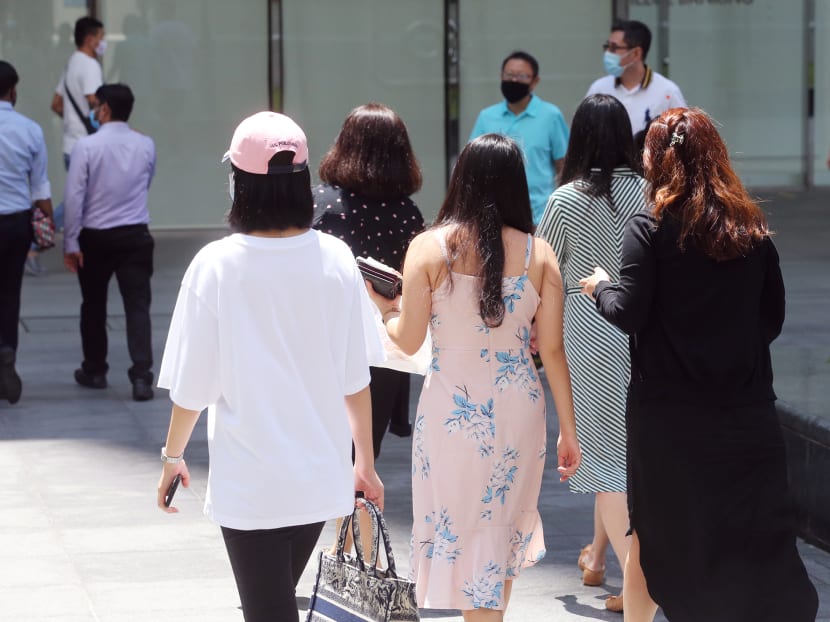Women's groups back White Paper, but Aware queries lack of recommendations for marginalised communities
SINGAPORE — Women's advocacy groups have broadly expressed support for a recently published White Paper on women's development in Singapore, although one has queried why it did not make recommendations specifically for marginalised groups such as migrant domestic workers.

- Women's rights advocacy groups here are largely supportive of the White Paper, which was submitted to Parliament on March 28
- The White Paper aims to build a "fairer and more inclusive society, where men and women partner each other as equals"
- The paper was put together after a year-long nationwide conversation on issues relating to women
- Gender equality advocacy group Aware, however, said the paper failed to include recommendations for marginalised communities
SINGAPORE — Women's advocacy groups have broadly expressed support for a recently published White Paper on women's development in Singapore, although one has queried why it did not make recommendations specifically for marginalised groups such as migrant domestic workers.
Others responding to the White Paper, submitted to Parliament on Monday (March 28), argued that a whole-of-society effort is needed to make further progress on the document's stated ambition to create a "fairer and more inclusive society, where men and women partner each other as equals".
In a Facebook post on Monday, the Singapore Council of Women's Organisations (SCWO) wrote that the action plans "further support the development of Singapore women, putting us in a better position since the start of the conversations".
The publication of the White Paper followed a year-long conversation involving almost 6,000 Singaporeans. It set out 25 action plans to be implemented over the next decade.
SCWO added that the recommendation to legalise elective egg-freezing was among the "many breakthrough recommendations... that help to lift a huge weight off women’s shoulders in terms of having to constantly choose between their personal lives and career".
“(It will) lift a huge weight off women’s shoulders in terms of having to constantly choose between their personal lives and career.Singapore Council of Women's Organisations on a recommendation on elective egg-freezing”
In a similar vein, Ms Georgette Tan, president of United Women Singapore (UWS), told TODAY in an email response to queries that the paper is a "comprehensive action plan that covers a wide range of areas of women's development".
"The action plans listed validate the programmes that we run such as the UWS Boys Empowered programme that was featured in the White Paper," she said.
Women's rights advocacy groups were also supportive of the proposal to progressively expand the availability of flexible work arrangements by introducing a new set of tripartite guidelines.
The SCWO wrote in its Facebook post that the move will "enable more women to meet both their family and career aspirations".
President of the Singapore Muslim Women's Association (PPIS) Hazlina Abdul Halim added that the enhancements to grants for caregivers would help caregivers "better juggle between their public and private domains".
This was a point raised by Leader of the House Indranee Rajah during a fireside chat at the Nanyang Business School International Women's Day Forum 2022 on Wednesday.
Ms Indranee said that many of the recommendations in the White Paper are to address issues and the unconscious biases on which they are predicated.
"One of the recommendations is how we can help women achieve success in the workplace. And the underlying assumption there, which has been a problem, is the assumption that women should be the ones to take care of children, take care of family (and) that puts a lot of pressure on women.
"And then they're often put in a situation where they have to make a binary choice. Do I continue with my career? Or do I put my family first?"
Ms Indranee added that although there has been a mindset shift, with more fathers stepping up to help out with chores and caring for children, "there's a lot more that can be done".
She cited another example, that of anti-discrimination legislation for women in the workplace, which would address the unconscious bias that certain jobs are not suited for women.
Other recommendations that deal with harassment in the workplace include guidance and training for small- and medium-sized enterprises in grievance handling processes and workplace harassment policies for affected employees.
Ms Corinna Lim, the executive director at the Association of Women for Action and Research (Aware), said: “We’re happy to see the strategy to establish more positive norms in workplaces via legislation.
"The Government has stated that legislation is not a panacea for all workplace ills; certainly discriminatory and harassing behaviours are underpinned by entrenched biases that need to be unlearned.
"However, the new law should make for both an effective deterrent and a strong signal to all of society that Singapore must be led by fairness and inclusion."
WOMEN IN MARGINALISED COMMUNITIES
Still, Ms Lim of Aware said that the paper did not include recommendations for women in other communities, such as migrant domestic workers, migrant spouses, religious and ethnic minorities and lesbian, bisexual and transgender women.
“These absences are puzzling, seeing that those women are valued members of society who contribute greatly to Singapore. Advancing gender equality means removing barriers for all individuals, not just some.Ms Corinna Lim, executive director of the Association of Women for Action and Research”
She added: "These absences are puzzling, seeing that those women are valued members of society who contribute greatly to Singapore. Advancing gender equality means removing barriers for all individuals, not just some.”
Ms Lim also said that the failure to include women from these communities was among the "missed opportunities that would have set us on an accelerated roadmap to progress".
Madam Hazlina from PPIS said that the organisation hopes for more support for the 'sandwiched generation', which "may potentially be vulnerable in the future, if they forgo their career due to the rising costs of living including caregiving assistance".
She said: "When it comes to both labour force participation rate and income, the reality is that women here still lag behind men. Economic growth is more robust and sustainable in the long run when both women and men are able to fully participate in the workforce.
"To better harness the potential of women, who are mostly caregivers, we need to effect transformational change."
On the wider push for a more equal society, the groups noted that progress should go beyond the policy level, and requires major mindset shifts and behaviour.
Ms Tan of UWS said: "It is going to take an equally comprehensive effort from the civil society, and public and private sectors working closely together to execute them.
"Change is not going to happen overnight but we are positive that with collaborative effort, we can change the society's mindset and behaviour."
Ms Indranee said that a societal shift is needed in the workplace to ensure that domestic responsibilities are for "all of society, for both men and women".











